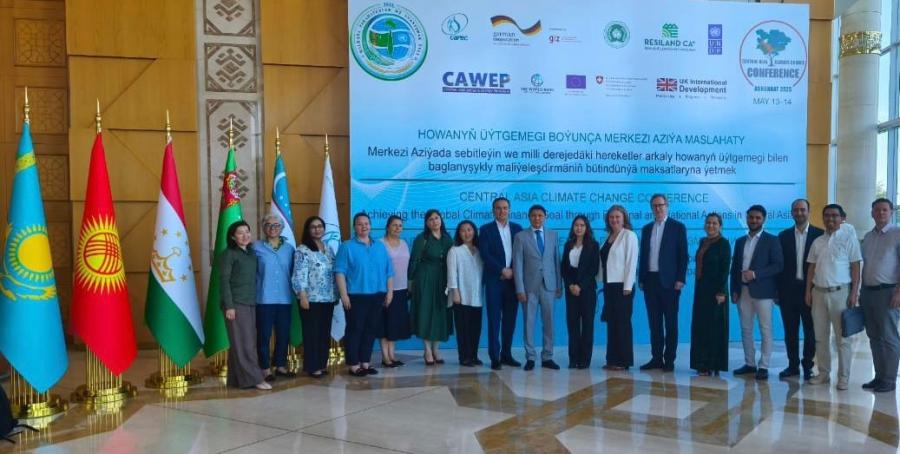C3A’s Key Contributions to CACCC-2025
 C3A at CACCC-2025
C3A at CACCC-2025
On May 13-15, C3A participated in the 2025 Central Asia Climate Change Conference (CACCC), hosted by The Central Asia Regional Environmental Centre (CAREC) and the Government of Turkmenistan, held in Ashgabat, Turkmenistan. Under the overarching theme of “Achieving the Global Climate Finance Goal through Regional and National Actions in Central Asia,” CACCC-2025 brought together high-level government officials, development partners, and technical experts to address the region’s pressing climate challenges. In line with this year’s theme, C3A organized and supported a series of strategic events that deepened the regional dialogue on climate finance and policy, reinforcing its commitment to supporting Central Asian countries in navigating a just and effective low-carbon transition.
Building Regional Scenarios for Low-carbon Development
On 12 May, ahead of the main conference, C3A hosted a regional scenario-building workshop “Regional Scenarios for Central Asia Workshop” to explore the economic impacts of climate change, identify opportunities for low-carbon development, and assess the political economy of climate decision-making. Attended by representatives from all five Central Asian countries, including Deputy Ministers of Finance, this high-level participation underscored the increasing political momentum behind using structured analytical tools to inform climate-related policymaking in the region.
Valerie Hickey, Global Director for Environment at the World Bank, offered support for the exercise, emphasizing how scenario planning can help governments understand and manage trade-offs between economic competitiveness and environmental resilience. Participants echoed the importance of complementing regional scenarios with national-level and subregional analyses and highlighted the need to frame these discussions around the water-energy-land nexus, a critical issue across Central Asia.
Discussions also touched on the potential for analytical models to support the scenario-building process and inform policymaking. While some concerns were raised about the capacity of Ministries of Finance to take the lead in the green transition, many saw scenario exercises as a valuable entry point to engage them. A representative from Turkmenistan acknowledged existing challenges in coordination but expressed openness to joining the regional steering committee, subject to domestic approval.
Advancing Innovative Climate Finance Solutions
During the main conference, C3A co-organized a high-level panel discussion on “Innovative Tools for Designing Climate Financing Strategies in Central Asia.” The session explored how coherent policy mixes, such as carbon pricing, subsidy reform, regulatory frameworks, and targeted fiscal incentives, can mobilize private and public finance, de-risk investments, and accelerate the transition to low-carbon, climate-resilient economies. Thanks to the contribution of different Ministries of Finance from the region, the session offered a comprehensive overview of the climate finance landscape in Central Asia, emphasizing the need to scale up funding for adaptation, which remains significantly underfinanced relative to mitigation.
Jibek Duisheeva, Deputy Minister of Finance of the Kyrgyz Republic, showcased the country’s progress in adopting green budgeting, a promising approach that has begun to gain traction in the region. Asferachew Abate Abebe, Senior Environmental Specialist at the World Bank, shared insights from a new regional report on air pollution, which estimated its economic costs at $15.2–$21.7 billion annually, equivalent to 3–5% of regional GDP in 2022. He introduced an innovative model for mobilizing private finance for public goods through Sustainability-Linked Bonds, which are tied to environmental performance metrics such as air quality improvement.
Regional experts also contributed to national perspectives. Ramin Kazymov, Deputy Director at the Institute of Economic Research under Kazakhstan’s Ministry of National Economy, and Dastan Abdyldaev, Program Coordinator at the Climate Finance Center under the Cabinet of Ministers of the Kyrgyz Republic, discussed recent pilot initiatives and the practical challenges of implementing and scaling climate finance instruments. Their experiences underscored the need for tailored policy support and capacity building to adapt global tools to national contexts.
Coordinating the Regional Dialogue on Financing the Transition
As part of the main CACCC-2025 agenda, C3A also contributed to the conference’s central plenary session on climate finance in Central Asia. The session brought together representatives from governments, multilateral institutions, and regional actors to examine the enabling conditions for mobilizing climate finance and advancing low-carbon transitions.
Discussions explored the role of financial instruments within broader macroeconomic and policy frameworks and considered how national plans and strategies can help improve access to climate finance. Speakers emphasized the need for coordinated policy action, institutional capacity, and long-term planning to attract both public and private investment.
Representatives from the United Kingdom, Germany, the European Commission, and Italy outlined their ongoing support to the region, while participants also noted structural barriers to finance mobilization. Valerie Hickey of the World Bank offered a critical perspective, pointing to systemic constraints in the global climate finance architecture, including limited availability of funds, procedural complexity, and nascent carbon markets, as ongoing challenges for countries in the region.
